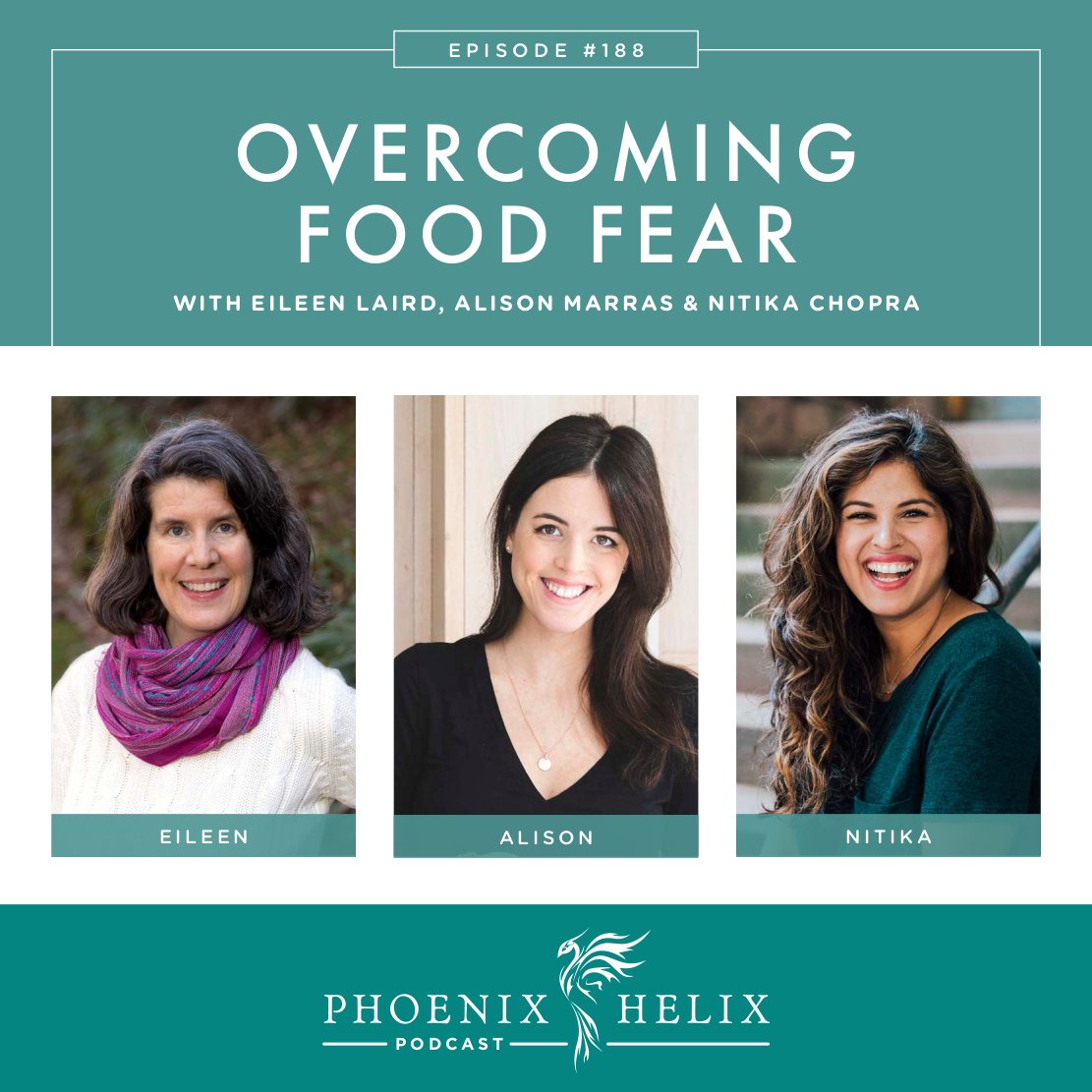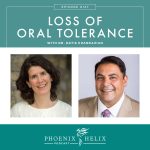Is Food Fear a Side Effect of the Paleo Autoimmune Protocol?
A common symptom of autoimmune disease is increased food sensitivity. When you first experience the connection between the food you eat and how you feel, that can be an empowering moment. But when certain foods cause you to flare, that can also inspire a fear of food. This is a natural reaction, but it also has consequences. The fear itself can cause autoimmune flares and also increase food sensitivity, creating a vicious cycle. Suddenly, all food feels dangerous, and we over-restrict our diets, which harms our health long-term. There is good news! We can overcome food fear, replacing it with a deep knowledge about our bodies and enjoy eating again. That’s our goal with our conversation today. My guests are fellow autoimmune warriors, Nitika Chopra and Alison Marras. We share our own experiences with food fear and tips for overcoming it.
Listen to the Show
- Subscribe to my podcast through your favorite podcast app: iTunes, Stitcher, Google, TuneIn, Spotify, Amazon, etc.
- You can also listen to the episode right here through the player below, and if you subscribe to my newsletter you’ll get notified of future episodes.
Podcast: Play in new window | Download
Show Notes
- Intro (0:00)
- Meet Our Guests
- Nitika Chopra lives with psoriasis and psoriatic arthritis. She’s a chronic illness advocate and founder of The Chronicon Online Community.
- Alison Marras lives with Hashimoto’s and PCOS. She’s a nutritional therapy practitioner who shares recipes and insights through her website, Food By Mars. She’s also the author of The Paleo Gut Healing Cookbook.
- Thank You to Our Podcast Sponsor – KC Natural (2:41)
- When you first begin the paleo autoimmune protocol, it can be pretty overwhelming. Most of your normal spices and condiments are off the table, and you’re desperately seeking flavor in the kitchen. KC Natural was created to fill that need. They started their company 6 years ago when they launched two different flavors of AIP-friendly barbecue sauce. Their company is located in Kansas City where BBQ is king! Since then, they have expanded their line to include AIP versions of ketchup, mustard, salsa, marinara, and teriyaki sauce. And they didn’t stop there. They’re always developing new delicious things. The latest products to hit their shelves are a selection of AIP spice blends, including a BBQ rub, seasoned sea salt, and meat & veggie seasoning. And coming soon, you’ll be able to buy a dairy-free AIP “buttermilk-style” ranch dressing! How awesome are they?
- Healthy convenience is hard to find in the AIP community, and I’m so grateful to KC Natural for being part of it. You’ll always find KC Natural in my pantry.
- If you’d like to stock up, KC Natural has a coupon for my listeners: 15% off with the code PHOENIX15. Place your order here.
- Discovering the Connection Between Food and Autoimmune Symptoms (4:28)
- Nitika:
- She was diagnosed with psoriasis at age 10 and psoriatic arthritis at 19. Her mother believed food had an impact and encouraged dietary changes, but Nitika wasn’t interested as a child or teenager. Her dermatologist told her that diet made no difference, so she ate whatever she wanted. At age 20, she went to India and worked with an Ayurvedic specialist. That was the first healthcare practitioner that told her diet is important. She followed his recommendations and noticed an impact immediately. Mom was right!
- Alison:
- Alison started experimenting with food when she pursued a career in health and nutrition coaching. At that point, she had health symptoms but no diagnosis. The first diet she tried was gluten-free, dairy-free, and she noticed a positive difference, but when she went paleo, that made a bigger difference. Her digestive and skin health improved dramatically. When she was diagnosed with Hashimoto’s and learned there was an autoimmune component, she went AIP, and the joint pain she had blamed on exercise disappeared. Those were empowering connections to make – that her food choices could give her some control over her symptoms.
- Eileen:
- I experienced rapid and severe onset of rheumatoid arthritis and was disabled within months. I was desperately seeking solutions, and it made sense to me that diet would make a difference. I tried vegetarianism and veganism first, but my symptoms continued to escalate. Interestingly, it was a vegetarian friend who recommended the GAPS diet. GAPS is similar to paleo. I noticed improvements immediately, which was a huge relief. Then, I went AIP which made an even bigger difference. Through the elimination and reintroduction process, I was able to discover my specific food intolerances and personalize my diet accordingly. However, I also lost a lot of weight when I wasn’t overweight to begin with. When we dramatically change our diets, it’s common to not eat enough enough of the foods allowed on our new diet. Expanding my diet within my body’s needs was an important part of my journey, too.
- Nitika:
- Our Experience with Food Fear (10:14)
- Alison:
- When Alison first did the elimination phase of AIP, she went into it with a positive mindset. She saw her kitchen like the set of the TV show Chopped and enjoyed creating new recipes. She also had a food blog where she could share them. When it came time for reintroductions, food fear creeped in. Her body felt great, and she was afraid she would undo all of the progress she had made. It was finally her lifestyle that pushed her to do reintros. She was traveling a lot, and being strict AIP made travel much harder.
- What helped her overcome her fear was realizing that food was just one piece of the puzzle. She had been focusing on it exclusively and blaming food for every autoimmune symptom. In time, she realized stress, sleep, mental and emotional wellness, and so many other factors play a role as well. Being able to see food as part of a larger picture allowed her to release the fear and obsession that had become attached to food.
- She also realized that when it comes to food tolerance, sometimes it’s about the dose. There are foods she avoids altogether, but there are other foods she’s learned she can tolerate once in a while, or in small amounts. Eileen’s reintroduction guide includes a two-phase process to help you find these foods.
- She also re-evaluated her goal with autoimmune disease. Many of us come to that alternative health community seeking a cure, but there is no cure for autoimmune disease. That search for the impossible can fuel feelings of failure and an obsession with our health that isn’t healthy. Changing her mindset and accepting that flares are part of life with autoimmune disease, allowed her to develop confidence in her own resilience.
- It’s rare for her to experience food fear now, but if it does arise, she knows how to work through it.
- Resource: Paleo AIP Reintroduction Series (which includes articles, podcasts, and interviews with people who have been through the reintroduction process themselves.)
- Nitika:
- While she’s a learned a lot about her body’s needs in 30 years living with autoimmune disease, she hasn’t completely overcome food fear, but she does have tools to address it when it arises.
- Like Alison and Eileen, she was searching for a cure in the beginning, and that ended up harming her health. She tried to combine a healing diet with other alternative interventions and a “manifest mindset”, believing she should be able to cure herself. The burden of that unrealistic expectation put incredible stress on her body, and her autoimmune symptoms escalated instead. Accepting autoimmune disease has been an important part of living a good life.
- She tried elimination diets five times. The most restrictive was a combination of AIP + an anti-candida diet. While her autoimmune symptoms improved, the rest of her health suffered. She started losing hair, developed acne, and overall just felt bad. Now she tries to balance eliminating foods that cause her strongest autoimmune symptoms (tomatoes, gluten, and soy), with allowing herself a more expansive diet that supports her whole body health, She also wants enough food freedom to have an occasional treat, like almond butter cups. It’s important that the choice is always hers. She’s an independent woman and doesn’t like anyone telling her, “You’re not allowed to eat this.”
- What’s challenging for her is that her body seems to change day-to-day. When it comes to mild/moderate food reactions, she sometimes tolerates a food well and a day later, the same food might cause a reaction. She’s 40 years old and her hormones are fluctuating, so it makes it hard to know what her body does and doesn’t want.
- Stress is also a huge factor in her inflammation and autoimmune symptoms, so she strives to reduce stress as much as possible, and that includes food stress, work stress, and personal stress. When she’s in a situation where she has less control over the food (like an event or wedding), she focuses on the stressors she can control. She’ll manage her time to avoid rushing. She’ll meditate. And she’ll nurture herself with essential oils or other comforts.
- Resource: Ep. 128: Mind-Body Nutrition. (Stress directly impacts digestion and food tolerance.)
- Eileen:
- My food fear was strongest in the beginning of my autoimmune journey. The connection between food and autoimmune symptoms was new knowledge, and I wanted to control that completely. I also feared that every flare would last forever and always cause permanent harm. So, if a food exposure caused a flare, my fear would escalate. I remember gasping in a restaurant when I realized they had added cayenne to my food (one of my biggest flare triggers). I didn’t eat in a restaurant again for over a year.
- I’ve now had rheumatoid arthritis for almost 10 years, and I have more experience with autoimmune resilience. I still don’t like flares (no one does) but I also know flares pass, and I have trust in my ability to manage a flare and to love myself through it. That diminishes my food fear. I’ve also learned that one restaurant food exposure doesn’t mean restaurants as a group are dangerous for me.
- I’m still careful about my diet and mindful of what I eat, and I do a lot of research before choosing a restaurant. I’m taking a trip soon, and it takes time and effort to plan the food component. What’s changed is there’s no feeling of panic now. Instead I focus on the rewards of the experience. Who am I sharing this meal with? What’s the atmosphere? I focus on joy instead of fear.
- Alison:
- Thank You to Our Podcast Sponsor – Functional Nutrition Alliance (38:10)
- Full Body Systems is their internationally acclaimed, 10-month online functional nutrition immersion training program.
- It’s designed by world-renowned educator, Andrea Nakayama. Many of you know her as one of my most popular podcast guests. Her unique way of working with patients often leads to results where other practitioners hit dead ends. This program teaches you to do the same.
- If you’re already trained as a health coach, nutritionist, or medical practitioner and want to more effectively help your clients break through healing plateaus, this class is for you!
- And if you’re an aspiring practitioner just getting started, this might be the only training you need.
- You’ll gain detailed knowledge of all the systems in the body, how they interact, how problems develop, and how to personalize diet and lifestyle recommendations for each unique client.
- Enrollment is currently open. To learn more, visit FxNutrition.com/Eileen.
- Beyond Food: Lifestyle Factors (39:35)
- Nitika:
- Things that may increase her autoimmune symptoms include overscheduling, overdoing, over-exercising, ignoring stress management, and not sleeping well. The good news is that she’s learned to manage her lifestyle to avoid doing these things most of the time. Currently food is her biggest flare trigger. It has the fastest and most direct impact on her symptoms.
- If she does experience a food-induced flare, what helps the most is surrender. She’ll rest, drink water, watch favorite shows on Netflix, and focus on being gentle and kind to herself. But this ability to surrender came after years of experience. In the beginning, she had a lot of resistance and would be more likely to try to push through and ignore a flare (which didn’t work). She’s a first-generation child of immigrants and has a history of pushing herself too hard. Self-compassion took time to develop.
- Resource: Ep. 143 – How to Survive an Autoimmune Flare.
- Alison:
- Lifestyle factors that influence her autoimmune symptoms are stress, lack of sleep, lack of boundaries, no time for joy, and a negative attitude toward her body. When her food fear was at its worst, she lost faith in her body’s ability to do anything. If she thought of her body as a child whose healing she wanted to support, Alison realized she was being too hard on her body. If her parent constantly questioned her ability to do the simplest thing, she wouldn’t rise to any occasion either. Learning to love and trust her body has been a big part of her journey.
- During flares, she agrees with Nitika that self-care and self-love are key. So often, we approach a flare with self-judgment and guilt instead: What did I do to cause this? What did I eat? That can take a tiny flare and make it huge and long-lasting.
- Mindful eating is also a big part of Alison’s life. A friend recommended a book called the Slow-Down Diet by Marc David, and it changed her approach to food. She realized she had been more focused on what she ate than how she ate, and both are important By slowing down and removing distractions, and approaching each meal with gratitude, not only did it improve her digestion, it also made food more pleasurable.
- Resource: Alison’s 5-Day Mindful Eating Challenge.
- Eileen:
- Fear tries to trick us into thinking it’s helpful, when it’s not – it’s harmful. It increases stress and decreases food tolerance. So, when I notice fear arise, I consciously strive to let it go. Here’s how I do it. First, I don’t let fear control me. I make the best choices I can while still living a full life that includes travel and the occasional restaurant meal. In the past, I had a lot of fear when traveling or eating outside of my own kitchen, and I would either avoid it, or find myself visualizing a flare any time I took a food risk. Now, when I’m in a situation where I don’t have complete control over the food (like a restaurant), I order carefully, but then I let go and repeat this mantra: “I choose joy.” When I’m traveling, I even write that mantra on the top of my planning list. That way, I actually enjoy the experience and I also give my body the best chance of tolerating the food I receive. If a flare comes, I also know I can navigate it.
- When it comes to food tolerance, going on autoimmune medication made the biggest positive difference for me. I avoided medication for the first 4 years after diagnosis, and while diet was hugely helpful in reducing my symptoms, it never put me in remission. Eventually, damage started happening to my body and I made the difficult choice of starting medication. I’m so glad I did. Medication allowed my body to go into remission, and this calmed my immune system enough that my food tolerance expanded. Foods I could never eat before I could now eat occasionally. In the alternative health community, there’s as much medication fear as there is food fear. Everyone talks about the risks without acknowledging the benefits. If you are medication-free and symptom-free, that’s wonderful. No one should take medication who doesn’t need it. But if you are medication-free, suffering, and experiencing autoimmune damage, that’s not wonderful. Integrative medicine is using all the tools at our disposal to live our fullest and healthiest lives.
- Resource: Medication Decisions Series.
- Nitika:
- Resources for Overcoming Food Fear (59:59)
- A healing diet isn’t healing when we’re living in constant fear. When we talk about managing our autoimmune symptoms, fear is one of those symptoms, too. It’s natural to arise in a life with chronic illness, and if you struggle with fear, you’re not a failure and you’re not alone. Here are some resources to help overcome food fear. It’s not about perfection. We cannot eliminate fear completely, but we can find tools to help us manage the fear when it arises.
- Eileen’s Paleo AIP Reintroduction E-Book – a step-by-step guide with recipes.
- Alison’s 5-Day Mindful Eating Challenge.
- Podcasts:
- Outro (1:01:30)
- Alison Marras is a nutritional therapy practitioner who works with people 1:1 and also through online groups. One of her areas of expertise is helping people overcome food fear. She also shares recipes and insights through her website, Food By Mars, and is the author of the Paleo Gut Healing Cookbook.
- Nitika Chopra is a chronic illness advocate and founder of The Chronicon Online Community, a place where you can find support among people who understand life with chronic illness. The focus is on nurturing joy and celebrating your whole being (not just your diagnosis). The first week’s membership is free, and Nitika also offers scholarships to those in need.
- Eileen (your podcast host) is the author of multiple books, written to help people thrive with autoimmune disease. Learn more on the Books Page.
- If you like this podcast, follow or subscribe through your favorite podcast app. You can also subscribe to Eileen’s biweekly newsletter.
- Check out the entire archive of podcast episodes.
You May Also Be Interested In
Spreading the Word
If you like the podcast, please leave a positive review in iTunes. It would mean the world to me, and also helps others find the podcast. Here are some quick instructions using your iPhone:
- If you are already subscribed to my podcast: (1) Click the purple podcast icon. (2) At the bottom of the screen, click Library. (3) At the top of the screen, click Shows. (4) Click the Phoenix Helix podcast image. (5) Scroll down the page, and you’ll see Ratings and Reviews. Scroll down a little bit more and click on Write a Review. This will bring up the review screen. Tap 5 stars (if you love the podcast), and then click in the title box, and it will bring up the keyboard. Enter a title and short review. (6) Click Send in the upper right corner. (7) Thank you! Positive reviews give the podcast a higher search ranking in iTunes, helping people find it and letting them know it’s a quality podcast and worth their time to listen.
- If you haven’t subscribed to my podcast: (1) Click the purple podcast icon. (2) In the lower right corner, click the magnifying class. (3) Type Phoenix Helix in the search box. (4) Click the podcast cover in the Show list. (5) If you’d like to subscribe, click the + sign at the top of the screen. (6) To write a review, scroll down the page, and you’ll see Ratings and Reviews. Scroll down a little bit more and click on Write a Review. This will bring up the review screen. Tap 5 stars (if you love the podcast), and then click in the title box, and it will bring up the keyboard. Enter a title and short review. (7) Click Send in the upper right corner. (8) Thank you! Positive reviews give the podcast a higher search ranking in iTunes, helping people find it and letting them know it’s a quality podcast and worth their time to listen.









It was such a pleasure to chat with you both on this important topic! xo
I feel the same! Thanks for sharing your experience and wisdom, Alison.